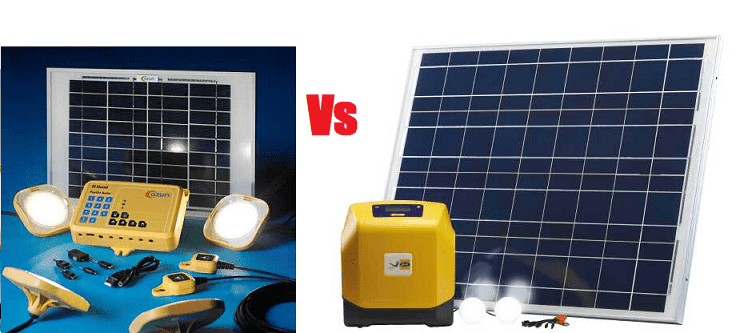2017 seems to be the year of pay as you go Solar Home Systems in Nigeria. Two systems, the Azuri Quad and the Lumos Mobile Electricity have been launched in the country this year. Both systems are aimed at providing pay as you go model for solar electricity in Nigeria. If you are wondering how these two solar home systems compare to each-other, we will be comparing the Azuri Quad and the Lumos Smart Solar System here.
Azuri Quad was launched in January 2017, a partnership between the Federal Government of Nigeria and Azuri Technologies. This was followed by the formal launch of the Lumos Solar Power System in February 2017. The Lumos system (a.k.a MTN Mobile Electricity) is a partnership between MTN, Nigeria’s largest mobile network and Lumos.
The two solar home systems share a lot in common, but have a lot of significant differences. They both tap energy from the Sun and convert it to electricity using their solar panels. Then, they use the electricity to charge the battery. Finally, if you pay your daily or monthly access fee they give you access to the stored energy via power output ports.
Cost of Ownership
The Azuri Quad and the Lumos Solar Power System work on the same pay as you go model aimed at making solar powered electricity more accessible to the masses. You pay a small amount daily or monthly to offset the cost of the product.
However, the two systems run the model differently. While in the Azuri system, you get the hardware free, the Lumos system requires a one-time payment of 20,000 Naira.
The running cost is also different. With the Azuri Quad, you pay a flat fee of 1,500 Naira per month, however MTN offers a number of subscription plans for the Lumos Solar Power System. You pay between 128 Naira per day and 230 Naira per day for MTN Mobile Electricity. This adds up to between 3840 Naira to 6000 Naira per month.
After several months of payment adequate enough to pay for the system, they unlock allowing you enjoy it free without further payment.
Checkout MTN Mobile Electricity Price in details.
Payment Tenor & Warranty
Both Solar Home Systems come locked. In order to use the units to power your appliances, you have to pay a daily or monthly access fee. However, after some months of payment the system unlocks permanently allowing you use the system free.
In the case of the Azuri Quad, you are required to pay for 36 months after-which the system unlocks permanently. Lumos Smart Solar System requires longer. You are expected to have paid for 1800 days (60 months) before the system unlocks.
As for warranty, the Azuri Quad comes with a 2 years warranty, while the Lumos Smart Solar System offers a 5 years warranty.
Solar Panel & Power Output
So far, the Azuri Quad seems to be a better deal. It is much more affordable and the duration of the installment payment is much shorter. However, cost is not the only consideration when buying a solar home system. The capacity is also very important.
The Azuri Quad comes with a 10W solar panel, while the Lumos Smart Solar System offers an 80W solar panel. This means Lumos can tap more energy from the Sun. In addition, the Lumos Smart Solar System is more powerful with a 300Wh energy rating.
Although we cannot confirm the energy capacity of the Azuri Quad, we know that the built-in battery has a capacity of 6500 mAh with a nominal voltage of 3.2V. This two information means that the energy capacity of the Azuri Quad cannot be more than 20.8Wh, if the first law of thermodynamics is anything to go by.
This means that the Lumos Smart Solar System has more than 14 times the energy capacity of the Azuri Quad, making it more practical in more applications.
Power Output Options
The Azuri Quad offers just one USB port, while the Lumos system has eight different ports (including two USB ports) for connecting your devices. In addition to the two USB ports, Lumos also has four 12V DC outputs that can supply up to 2A and two Car Cigarette sockets rated at 12V/8A.
The result is that Azuri Quad is restricted on the devices it supports (limited to light, mobile phone charging, and radio), while Lumos is more versatile with even the ability to power a TV, laptop, and fan.
AC Output
Both the Azuri Quad and the Lumos Solar Power System supply DC voltage. However, because the Lumos system has more energy capacity and offers car cigarette sockets, it can host a small inverter that can convert the DC output to AC output, enabling it power devices like TV, fan, and laptops.
In Nigeria, MTN bundles the Lumos system with a 60W inverter, which effectively makes it a Solar Inverter.
Availability
Both off-grid Solar Home systems are available in Nigeria. However, Azuri Quad seems to be restricted to the Northern part of Nigeria. The MTN powered system is more accessible as the top network operator in Nigeria says you can buy the Lumos system at any of its Walk-in centres nationwide.
This article covers what we consider to be the major noteworthy differences between the Azuri Quad and the Lumos Solar Power System. We hope they answered most of your questions. If we left out any you consider important, please drop a comment to remind us.







